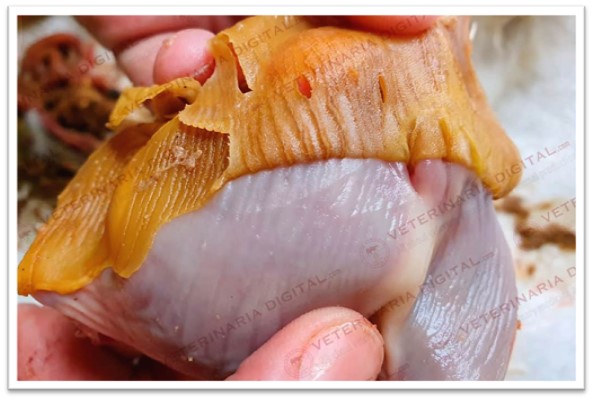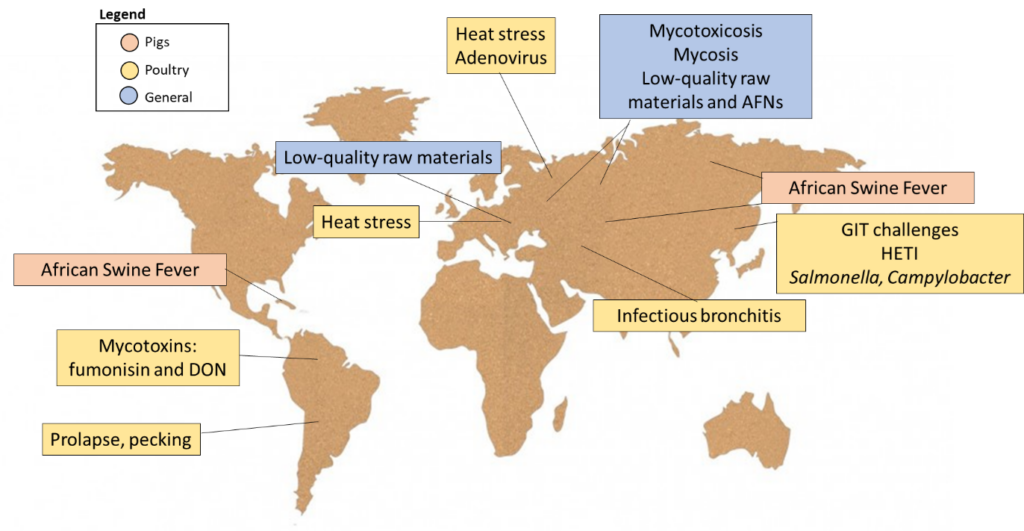
General analysis
Generally, the situation is similar to that of the prior month due to the high temperatures and moisture that still affect the Northern hemisphere, which promote the growth of Penicillium, Aspergillus and Fusarium. These fungi cause digestive mycoses and produce mycotoxins (aflatoxins and ochratoxins), particularly Aspergillus and Penicillium. They also decrease feed quality.
In the Southern hemisphere, low temperatures lead to an increase in respiratory problems caused by virus. Some countries that import US grain have issues with deoxynivalenol (DON) contaminations.
Concern about the presence of mycotoxins in dairy feed increases, particularly of aflatoxin, since it poses a risk for human health.
Analysis of geographic areas
This August of 2021, the following issues were described in poultry and pig farms in the different world areas:
· Asia
In China and other Asian countries, pig farms remain affected by African Swine Fever (ASF) outbreaks that spread though the Northern area. There is an increasing interest to design and apply effective protocols to repopulate pig farms in a secure way after overcoming the outbreaks. This situation is similar in other areas, such as Europe.
In poultry, there is concern about gut challenges such as E. coli and necrotic enteritis, and also about other diseases like infectious toxic hepatoenteritis (HETI). In breeders, efforts focus on the control of zoonotic microorganisms like Salmonella and Campylobacter.
· Russia and Ukraine
Fungal contamination in grain is high due to the environmental conditions affecting the area. Mycoses, such as the ones caused by Aspergillus, and mycotoxin issues are highly prevalent.
Problems derived from poor feed quality remain, particularly those related to corn, soy and sunflower products. There is shortage of qualified raw materials, which increases their price, particularly that of soybean meal. Therefore, many producers use rapeseed products as a temporary replacement. This leads to gastrointestinal disorders in birds and pigs, since rapeseed contains more antinutritional factors (ANFs). Sunflower meal is an issue, too, as it contains high fiber levels.
Poultry farms remain affected by heat stress and suffer from cage fatigue syndrome and eggshell problems. The other reported issues in the area are secondary infections, respiratory disorders and adenovirus was isolated from sick birds in several farms.
· Europe
In poultry farms, high temperatures in the area keep causing heat stress, which leads to worse performance results, bone, and eggshell problems (in layers).
As mentioned above, some farms from countries affected by ASF are looking for effective protocols to repopulate the farms in a secure way once they have recovered from the outbreak.
· Latin America
Analyses of raw materials show that fumonisin and sesquiterpene mycotoxins, such as deoxynivalenol and 3-acetyl deoxynivalenol, are present in high concentrations in cereals like corn and can be harmful for animal health.
Pecking and oviduct prolapses related to excessive weight and fat levels are observed in breeders. Besides, there is evidence of ASF outbreaks in the Dominican Republic, near the Haiti’s border.

